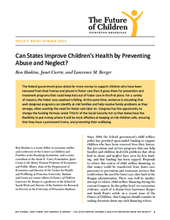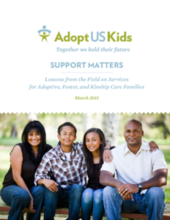Displaying 1931 - 1940 of 2176
This brief from the Future of Children Journal, a collaboration of the Woodrow Wilson School of Public and International Affairs at Princeton University and the Brookings Institution, outlines the current state of the Child Welfare System in the United States, particularly federal funding to individual states’ child welfare systems.
This review of literature covers international material related to stability and permanence for disabled children, in particular permanence achieved through fostering and adoption.
A small number of Native American tribes in the USA are receiving federal foster care assistance. This article explores why.
A recent report from the Inspector General of the United States has revealed that many children in foster care in the US who are enrolled in the Medicaid health insurance program are not receiving adequate medical care, says the article.
In this brief article, the authors make their case for extending the age limit for young people to receive care in the foster care system, focusing on the UK and the US.
This article highlights recent research from the US revealing that supporting youth in transitioning from foster care can help to promote strong mental health and to protect youth from developing mental health difficulties later in life.
A new bill has been introduced in the state of Oregon in the United States which would allow grandparents to maintain legal custodial rights of their grandchildren when their grandchildren’s parents have had their parental rights terminated.
This articles shares the stories of two adoptees in the US from South Korea who are part of a group called Adoptee Solidarity of Korea, which campaigns for an end to international adoption.
The researchers in this study generated population-level estimates of the relationship between maternal history of maltreatment and next-generation abuse and neglect in teenage mothers in California, USA.
This guide is intended to equip State, Tribal, and Territorial child welfare managers and administrators — as well as family support organizations — with current information about effective strategies for developing data-driven family support services and research findings to help them make the case for implementing and sustaining these services.


